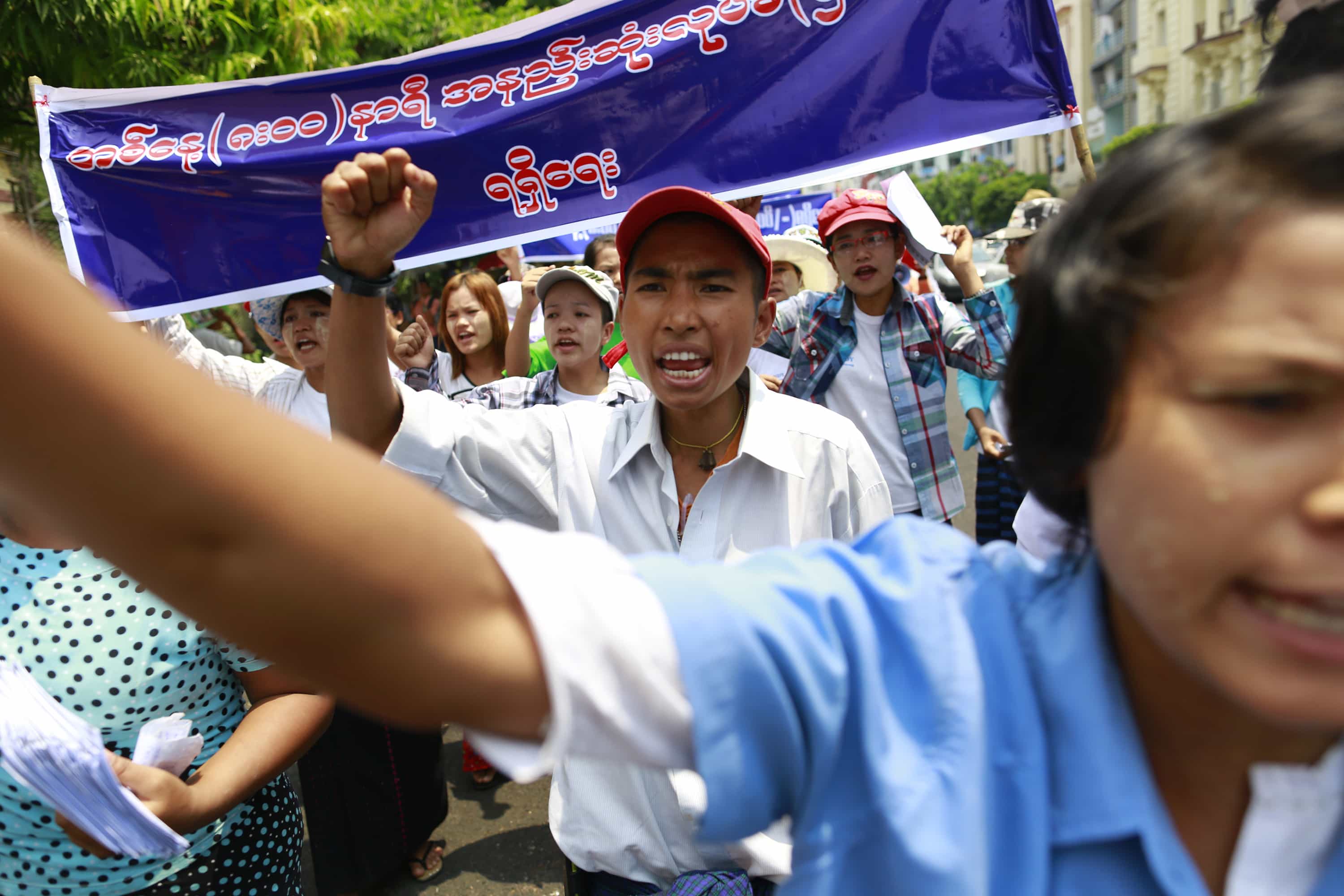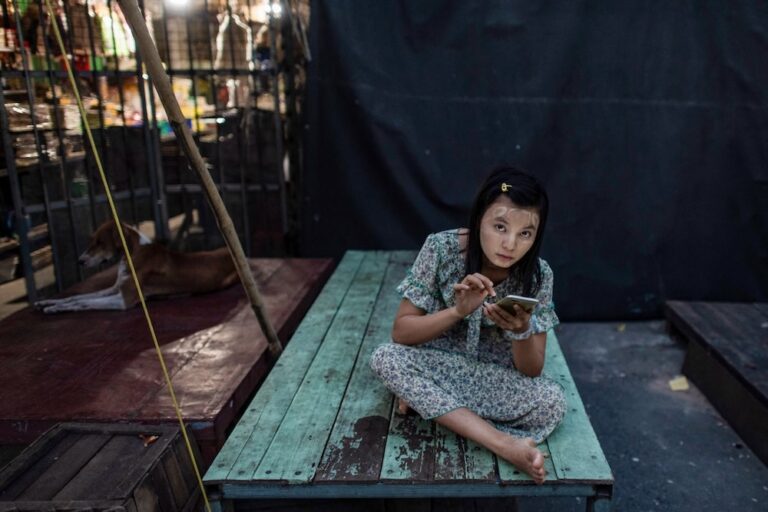With 13 months remaining before general elections in Burma, ARTICLE 19 provides an overview of the situation, focusing on broadcasting reform, protest laws, Constitutional change and more.
This article was originally published on article19.org on 1 October 2014.
By Oliver Spencer
With 13 months remaining before general elections in Myanmar, defending freedom of expression and information is more critical than ever. Like all transitional processes, it’s a complex, contradictory and confusing situation. Here’s a snapshot of what ARTICLE 19’s office in Yangon has been seeing on:
Government engagement
Constitutional change
Parliamentary practice
Broadcasting reform
Press council
Protest
Judicial change.
DISCIPLINED FREEDOM
“Discipline” is the word of the moment in Myanmar, something that the people have lived and breathed since 1962. An end to decades of political, civil, social, economic and cultural discipline is fearful to many.
The nexus between freedom and discipline permeates every issue and frames every solution. Civil society wants new laws to protect new freedoms; the government wants new laws to provide “discipline”.
Civil society is rapidly realising that the drive to change out-dated legislation is not necessarily in their best interests. Change slows as a result.
And of course, civil society often urges “discipline” itself – many look to the growing conflicts with the Muslim community, but also in any conversation around women, the need for disciplined freedom is repeated.
(Watch this space for more on our project focused on women and freedom of expression in Myanmar.)
GOVERNMENT ENGAGEMENT
It’s rare that human rights defenders find governments open to engagement, and rarer still to have a positive word to say on the Myanmar government. Perhaps the government are simply playing the game in order to placate foreign interests, perhaps such interests have told them to do so in order to make money. Whatever the reason, so far the government are comparatively accessible.
This is not to say that the old ways have gone, but who would have thought that five years after the Saffron Revolution, ministers would be parroting “international standards” so fluently? (Okay, so they clearly don’t know what the standards are, but that’s not the point.)
Right now, ARTICLE 19 is engaging on providing advice on international standards and elections to the government for the 2015 elections.
ALL EYES ON THE CONSTITUTION
From now until the elections next year, what limited mandate this government has will largely and rapidly disappear, and any new laws seem unlikely.
All eyes in Myanmar are on the Constitution and whether the opposition parties will change two articles that cover 1) the possibility of constitutional amendment, and 2) whether Aung San Suu Kyi can be a presidential candidate (the constitution currently rules her candidacy out on the grounds that her deceased husband was a foreigner).
Over the past year, ARTICLE 19 and others in civil society have been submitting comment to a parliamentary committee charged with putting together a recommended amendment to the constitution.
Individuals and groups nationwide have written submission but the committee is so opaque, nobody even knows what they are doing or what submissions came in.
All the committee has said publicly is that many people have written advising not to change anything. Apparently last week they concluded their analysis, but nothing has been made public.
PARLIAMENTARY GAMES
The lack of transparency is obvious across parliament. Most decisions are made by consensus rather than by open political debate, so understanding which party is taking what position is hard to establish.
Leaders are beginning to emerge in parliament on different issues, but not necessarily with open support.
A case in point was an MP who last week put before parliament an amendment to the horrendous colonial Official Secrets Act, only to be the only person standing when a vote was called on whether to proceed.
The lack of transparency and access feeds the rumour mill. Last week one media outlet was slapped down after reporting that the National League for Democracy may select parliamentary speaker -and former general- Shwe Mann as president. Strange though this rumour sounds, the publisher is well respected.
There are also calls for parliament and the executive to kick out the head of the Election Commission, a man who has overseen a system, process and practice that has done little to convince the world that free and fair elections are possible in June country.
BROADCASTING REFORM
Two bills analysed by ARTICLE 19 and that fail international standards are before parliament on regulating broadcasting and public service media. The draft laws will do little to enable competition or serve the public(s) interest. The question is whether they will get beyond the committee stages in the run up to an election.
These drafts come shortly after the adoption of a News Media Law regulating the press that ARTICLE 19 has found to have some real issues.
Right now, the only tv and radio channels are government-controlled and it’s highly unlikely that this government will adopt the broadcasting law and bylaws before next years general election -they’ve seen the rocketing criticism from the print media, they’re not going to jump to give out licences to the same independent voices so that they can speak directly in peoples homes.
Similarly it’s unlikely that the public service media bill will get much further, although the chances are probably higher. Word is that the Ministry of Information knows that it shouldn’t exist in a real democracy and is looking to silently morph into such a public service institution.
There are also some smaller less important laws circling around, such as on advertising and film. The debacle over adopting two media laws this year has left civil society very cautious about whether these laws are for protecting freedom of expression, or enforcing discipline. The Ministry feels bruised too by the public reaction.
THE PRESS COUNCIL AND THE COMPLAINTS MECHANISM
The Interim Press Council has got much of the formal policy ready and is likely to become a permanent council at the end of 2014. The IPC has been criticised from all sides – the government wants more discipline and many in the media believe it is illegitimate, having been created by the Ministry of Information rather than journalists themselves.
The IPC hasn’t yet had its bylaws adopted by the president (yes, the executive is deciding how the press will be managed!). The bylaws will create a complaints mechanism for members of the public to go to if they believe a media house has broken the IPC’s Code of Conduct.
In the absence of bylaws, the IPC has been informally accepting applications in order to mediate, mostly through time consuming face-to-face meetings. Unsurprising therefore that they’ve only received 82 complaints so far.
The devil is in the detail of course, as three quarters of the complaints have not come from individuals trying to protect their rights, but rather from the Ministry of Information itself. The ministry’s complaints have been largely banal, with the majority being about either alcohol and tobacco advertising or the state of women’s (un)dress.
Worse, some civil society groups have privately alleged that when they’ve complained about more critical issues, such as incitement to discrimination and hostility (violations of IPC Code of Conduct 10.1-3), the IPC has remained silent.
PROTEST LAWS
The use of the assembly law to punish those that speak out publicly through protest or direct action is continuing unabated despite parliaments attempts to amend article 18 and remove the requirement for gaining permission. (See ARTICLE 19’s work with parliamentarians on changing the law.)
Just this week three people were sentenced to prison under article 18 for planting mangrove trees in an area of environmental degradation. Apparently the local police and courts regard rehabilitating natural fora to be a criminal offence. One of the people was charged under Article 18 three times for encouraging others in the area to plant trees too. (See ARTICLE 19’s review of the problems in the newly amended assembly law.)
JUDICIAL CHANGE
Lawyers are adjusting to their newfound role as public advocates, moving from a system in which they facilitated bribes to, at the bare minimum, a system where they ignore the rampant bribes changing hands.
Some of the best lawyers are grappling with changing the law, trying to expand the court’s interest and understanding of how a rule of law system should work. There are some judges too that seem to be beginning to think more about the value of their independence from the executive- in the last few months alone, the Supreme Court has written to the president explaining how important it is to separate the powers.
Other lawyers are trying to force the hand of the government. This has resulted in criticism from some that by doing so, they’re sacrificing the interests of their clients at the alter of the interests of the people in the long term.
We’re not so sure it’s that clear cut. In a recent case of 50 journalists being arrested for protesting at the heavy sentence handed to their colleagues, the journalist unions set out to get them freed (which worked) but then faced criticisms from the journalists themselves who wanted to go to prison in order to shine a light on the inadequacy of the law itself.



